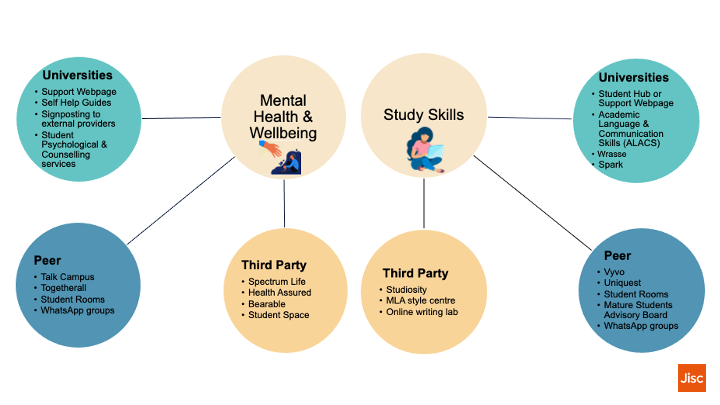Mature students represent a considerable proportion of the Higher Education (HE) student body and are predicted to grow. At Jisc, we have been delving into the future to consider how universities can support the rising number of students aged 25 and over. How does the existing framework of support services, cater to their diverse needs, what needs to change and what needs to be built upon?

Mature students at Leeds Lifelong Learning Centre
The growing body of mature students have support needs
In 2021, 62% of enrolled UK degree were mature students, over 21, and 34% were 25 and over. The costs associated with pursuing a degree is the greatest barrier to education for mature students, and this has been exacerbated by the rise in cost of living. In 2025, the UK government will introduce the Lifelong Learning Loan Entitlement (LLE) that will help to widen participation by providing a lifetime loan for post 18 education. We expect growth in mature students entering education to reskill or upskill for career progression or to fulfil a lifelong dream. As the mature student body increases, support services need to scale.
Mature students come from diverse demographics and their support needs are unique. Some are embarking on a degree path sometimes after leaving education at the age of 16 and some pursuing a masters. They are often limited time. They have significant pressures outside of university that warrant different support needs and flexibility. Many of them are live off campus and report family and job responsibilities as one of the top barriers to participating in Higher Education and succeeding in education. In 2016/17, the undergraduate mature student’s dropout rate was double that of younger students

What is the role of digital services in supporting mature students?
Today a mature student enrolling into a degree or PhD at a UK university will be signposted to a variety of in person and digital support services (Image below). Support ranging from career guidance to study guides to third party wellbeing mobile apps such as Bearable . Academic tutors and support staff are students go-to for guidance and support. While most of the mature students we spoke with praised staff, they recognise their restricted availability. Responses are typically limited to 8am-5pm, however many mature students study out of hours and must rely on online support. This support can come from student hub webpages, tutorial videos, service desks, FAQ search engines, live chats and increasingly AI (Artificial Intelligence) assisted services such as Studiosity. The challenge is not the variety of support services available, instead it is when they are delivered and how.

Mature students need responsive advice at extended studying hours. A nursing student who needed support to manage the often-overwhelming pressures of transitioning back to study, working and responding to important care needs, could not receive support by sieving through impersonal online self-help guides. “I need to speak to somebody there and then, that’s the only way I can regulate and just move past the issue” 41-year-old nursing student and mother. Another student highlighted the need to study at night and receive IT support even when working at 4am. “Support provided during extended hours, after 5pm or before 9am, may be of more use to mature students due to flexibility” – Clare Young, University of Bristol mature student recruitment officer.
Digital services help to provide crucial emotional and peer support
Most of the mature students we spoke with, emphasised the importance of emotional wellbeing support to succeeding in education. A 2022 study showed that 4 out 5 university students have mental health difficulties and students struggle with emotional health. Wellbeing support services need to be proactive at reaching out to mature students before they feel overwhelmed, unable to manage and drop out. Reliance on in person counselling services to meet the wellbeing needs of the growing number of mature students will be challenging to scale. Students who complete counselling referral forms online often wait days for a response. Third party support providers can help universities to deliver a consistent level of support to students at the times they need it most. University of Exeter and University of Kent have partnered with Spectrum.life to provide students with 24/7 online, text and telephone support from qualified counsellors and mental health professionals. TalkCampus and togtherall apps which provide 24/7 peer wellbeing support and students can 24hr text support through Student Space .
Peer support networks have been found to be crucial to student’s emotional wellbeing and succeeding in their studies. One mature anthropology student, shared “I had not realised how important having a peer network was to me until I made friends with other students on my course.” Another student suggested “social currency is a massive challenge for mature students” and that staff need to support mature students to gain social capital with younger peers, so they can to improve group work and achieve higher grades. An increasing number of universities encourage WhatsApp groups that are facilitated by support staff, as a way for mature students to receive peer support and build their network. Through peer mentorships and socials such as University of Bristol’s mature student advocates and mingles, students receive support from peers with shared experiences. Peers who relate to issues they face; isolation, not feeling included and staff not recognising their needs.
Digital support platforms can also enable universities to create engaging and accessible peer programs such as Vygo’s successful 24/7 peer to peer mentoring programmes at Coventry University and the University of Greenwich
We need to focus on making support services tailored and accessible
Out of the 30 UK universities included in our study, over 90% provided online support resources that can accessed 24/7. Birkbeck is one of many universities partnering with Studiosity to provide 24/7 writing feedback and most students can receive IT (Infrastructure & Technical) support through 24/7 service desks. However, provision of 24/7 digital services do not make support accessible . Video tutorials and web pages are available if you know they exist. You can be signposted to support services through emailed student newsletters if you can find them. WhatsApp groups that provide informative peer support networks are easily accessed if you have been included. Relevant wellbeing advice can be provided in online webchats like Student Spaces, if you are comfortable using digital services
At Jisc we are building the case for data driven approach to support services, data analytics and peer networks can help to provide time limited mature students targeted access to relevant services. Leeds and Bristol University have a central webpage with information targeted at mature students. At Leeds University Lifelong Learning centre, the peer led Mature Students Advisory Board provides a space to gather data on students concerns and address them. Is your university interested in using digital services to support mature students at scale? Are you interested in developing digital peer networks? We would like to hear from you, please get in touch at innovation@jisc.ac.uk

One reply on “How can digital services support Mature Students to succeed in education?”
Great article. Really insightful.